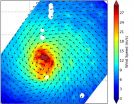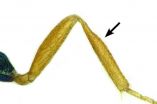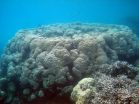Climate change reduces coral reefs' ability to protect coasts
2015-07-22
(Press-News.org) WASHINGTON, D.C. - Coral reefs, under pressure from climate change and direct human activity, may have a reduced ability to protect tropical islands against wave attack, erosion and salinization of drinking water resources, which help to sustain life on those islands. A new paper gives guidance to coastal managers to assess how climate change will affect a coral reef's ability to mitigate coastal hazards.
About 30 million people are dependent on the protection by coral reefs as they live on low-lying coral islands and atolls. At present, some of these islands experience flooding due to wave events a few times per decade. It is expected that this rate of flooding will increase due to sea level rise and coral reef decay, as the remaining dead corals are generally smoother in structure, and do less to dissipate wave energy. Loss of coral cover not only causes increased shoreline erosion but also affects the sparse drinking water resources on these islands, which may eventually make these islands uninhabitable.
In order to prevent or mitigate these impacts, coastal managers need know to what extent their reef system may lose its protective function so that they can take action. The new study by researchers from the Dutch independent institute for applied research Deltares and the U.S. Geological Survey gives guidance on a local reef's sensitivity to change. The new research has been accepted for publication in Geophysical Research Letters, a journal of the American Geophysical Union.
To gain insight into effects of changing conditions on coral reefs, the study authors used Xbeach, an open-source wave model. The computer model was first validated using field measurements obtained on the Kwajalein Atoll in the Marshall Islands in the Pacific Ocean, and was then used to investigate what the effects on water levels, waves, and wave-driven runup would be if certain reef properties change. Reef roughness, steepness, width and the total water level on the reef platform are all important factors for coastal managers to consider when planning mitigating measures, according to the study's authors.
The results suggest that coasts fronted by relatively narrow reefs with steep faces and deeper, smoother reef flats are expected to experience the highest wave runup and thus the greatest potential for island flooding.
Wave runup increases for higher waves, higher water levels that are expected with sea level rise, and lower bed roughness that occurs as coral degrades and becomes smoother. These are all expected effects of climate change. Rising sea levels and climate change will have a significant negative impact on the ability of coral reefs to mitigate the effects of coastal hazards in the future, according to the new study.
INFORMATION:
The American Geophysical Union is dedicated to advancing the Earth and space sciences for the benefit of humanity through its scholarly publications, conferences, and outreach programs. AGU is a not-for-profit, professional, scientific organization representing more than 60,000 members in 139 countries. Join the conversation on Facebook, Twitter, YouTube, and our other social media channels.
Deltares is an independent institute for applied research in the field of water and subsurface. Visit http://www.deltares.nl
USGS provides science for a changing world. Visit USGS.gov.
The following press release and accompanying images can be found at: http://news.agu.org/press-release/climate-change-reduces-coral-reefs-ability-to-protect-coasts/
AGU Contact:
Nanci Bompey
+1 (202) 777-7524
nbompey@agu.org
USGS Contact:
Leslie Gordon
+1 (650) 329-4006
lgordon@usgs.gov
Deltares Contact:
Mariska van Gelderen
+31 (0)6 13 67 13 70
Mariska.vanGelderen@deltares.nl
ELSE PRESS RELEASES FROM THIS DATE:
2015-07-22
Poor schools that have more black and minority students tend to punish students rather than seek medical or psychological interventions for them, according to a Penn State sociologist.
"There's been a real push toward school safety and there's been a real push for schools to show they are being accountable," said David Ramey, assistant professor of sociology and criminology. "But, any zero-tolerance policy or mandatory top-down solutions might be undermining what would be otherwise good efforts at discipline, and not establishing an environment based around all the options ...
2015-07-22
BEER-SHEVA, Israel...July 22, 2015 - Ben-Gurion University of the Negev (BGU) and University of Colorado researchers have developed a dynamic "smart" drug that targets inflammation in a site-specific manner and could enhance the body's natural ability to fight infection and reduce side effects.
The uniqueness of this novel anti-inflammatory molecule, reported in the current issue of Journal of Immunology, can be found in a singular property. When injected, it is as a non-active drug. However, a localized site with excessive inflammation will activate it. Most other anti-inflammatory ...
2015-07-22
Edward Snowden's leak of classified documents to journalists around the world about massive government surveillance programs and threats to personal privacy ultimately resulted in a Pulitzer Prize for public service.
Though Snowden had no intention of hiding his identity, the disclosures also raised new questions about how effectively news organizations can protect anonymous sources and sensitive information in an era of constant data collection and tracking.
A new study by University of Washington and Columbia University researchers that will be presented next month ...
2015-07-22
Amsterdam, The Netherlands, July 22, 2015 - In a large population-based study of randomly selected participants in Germany, researchers found that mild cognitive impairment (MCI) occurred significantly more often in individuals diagnosed with a lower ankle brachial index (ABI), which is a marker of generalized atherosclerosis and thus cumulative exposure to cardiovascular risk factors during lifetime. Interestingly, this strong association was only observed in patients with non-amnestic MCI, but not amnestic MCI. There also was no independent association of MCI and intima ...
2015-07-22
Typhoon Halola's strongest typhoon-force winds were located on the northern half of the storm, as identified from the RapidScat instrument that flies aboard the International Space Station.
RapidScat gathered surface wind data on the Typhoon Halola on July 21at 2 p.m. GMT (10 a.m. EDT). RapidScat data showed that the strongest sustained winds stretched from northwest to northeast of the center at speeds up to 30 meters per second (108 kph/67 mph). Strong winds wrapped around the center of circulation from northwest to east to the southern quadrant, while the weakest winds ...
2015-07-22
Much to his own surprise, Hannes Baur from the Natural History Museum Bern not only reports on whole two new parasitoid wasps at the heart of Europe, the Swiss Alps and Swiss Central Plateau. While the common discovery usually involves cryptic, or "camouflaging" within their groups species, his stand out. Baur's work is published in the open-access journal ZooKeys.
The insects he describes are visibly quite unique with their body structures. In the case of the Pteromalus briani wasp, its extraordinarily protruding hind legs differentiate it among the whole family. Meanwhile, ...
2015-07-22
CHAMPAIGN, Ill. -- A study of the West Nile virus risk associated with "dry" water-detention basins in Central Illinois took an unexpected turn when land managers started mowing the basins. The mowing of wetland plants in basins that failed to drain properly led to a boom in populations of Culex pipiens mosquitoes, which can carry and transmit the deadly virus, researchers report.
A paper describing their findings is in press in the journal Ecological Applications.
The team, led by University of Illinois postdoctoral researcher Andrew Mackay, found that mowing down cattails ...
2015-07-22
GeoSpace
Warmer air, less sea ice lead to mercury decline in Arctic Ocean
The amount of mercury in the Arctic Ocean is declining as the region rapidly warms and loses sea ice, according to a new study. A new study in Geophysical Research Letters suggests that fish, marine mammals, polar bears, whales and humans in the Arctic might potentially be consuming lower amounts of toxic methylmercury as the region warms.
Eos.org
Puzzles invite you to explore Earth with interactive imagery
The EarthQuiz challenge can take you to virtual field locations with just the click of ...
2015-07-22
The Mississippi River delta is a rich ecosystem of barrier islands, estuaries, and wetlands that's home to a diverse mix of wildlife -- as well as more than 2 million people. Over the past few decades, the shape of the delta has changed significantly, as ocean waves have carved away at the coastline, submerging and shrinking habitats.
To keep flooding at bay, engineers have erected dams and levees along the river. However, it's unclear how such protective measures will affect the shape of the river delta, and its communities, over time.
Now researchers from MIT and ...
2015-07-22
MELBOURNE, FLA. -- The coral reefs that have protected Pacific Islanders from storm waves for thousands of years could grow rapidly enough to keep up with escalating sea levels if ocean temperatures do not rise too quickly, according to a new study from Florida Institute of Technology.
The study, published Wednesday in the journal Royal Society Open Science, provides the first evidence that well-managed reefs will be able to keep up with sea-level rise through vertical growth. But that can happen only if carbon dioxide levels in the atmosphere stay below 670 parts-per ...
LAST 30 PRESS RELEASES:
[Press-News.org] Climate change reduces coral reefs' ability to protect coasts



